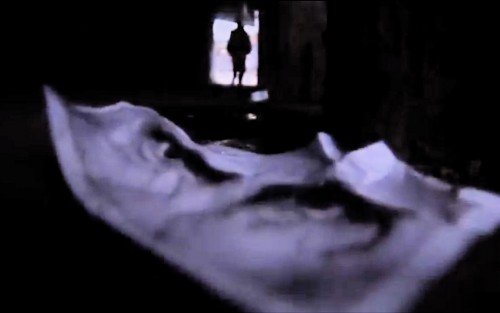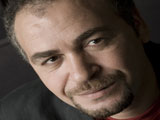The Prague Writers’ Festival: Bright Lights, Blown Out?
by Hamdy El-Gazzar and translated by Nour Abdelghani / May 20, 2013 / No comments
As a 90% budget cut potentially heralds the end of the Prague Writers’ Festival, Hamdy el-Gazzar remembers his attendance in 2012.

Still from the opening authors film for the 2012 Prague Writers' Festival. The year's theme was 'Only the Future Exists.' Photo: tomato22 via YouTube.
At the beginning of this month I received a note from the American poet Michael March, the founding president of the Prague Writers’ Festival. The note had a sad, apologetic tone and was written in the same poetic verse that March uses regardless of what he’s writing. He wrote: “Civil war is breaking out in Prague. For the first time, we are subjected to political censorship. They are planning on cutting the festival budget by 90% after twenty-three years. After twenty-three successful cycles of the festival, which included the literary masters of the world, the Prague Writers’ Festival’s candle is being blown out.”

- “From Egypt” attempts to draw a cultural map of Egypt and the Arab world by profiling the artistic, literary, and political issues that affect the region via on-the-ground coverage of current events, publications, and the fight for freedom of expression.

- Hamdy El-Gazzar is an Egyptian writer and one of the 39 young Arab writers included in the Beirut 39 Project. His first novel, Sihr Aswad (Dar Merit, 2005) won the prestigious Sawaris Award, and was subsequently translated by Humphrey Davies (Black Magic, AUC Press, 2007). His second novel, Ladhdhat Sirriyya (Secret Pleasures) was published by Dar al-Dar in 2008. He is currently working on a third novel.
A year ago I did not know March, but he knew me. I have only one novel translated into English and I am not famous like Adonis or Saadi Youssef or Bahaa Taher or Sonallah Ibrahim—all big names that March has invited to the festival. But last year the festival’s poet-president sent me an invitation to participate with a group of worldly authors: Hanif Kureishi (England), Anita Desai (India), Juan Goytisolo (Spain), Duo Duo (China), and Jerome Rothenberg (United States). After two hours of surfing the Prague Writers’ Festival website, I gathered that March had bestowed a high honor upon me with his generous invitation. In the past the festival has included only the most prominent Arabic poets and novelists.
So I went to Prague for the first time in my life and found myself inside the Museum of Architecture and Arts with music playing everywhere around me. That year the festival was superbly organized, generously hospitable, and all of its readings and panels were sold out two weeks in advance. I loved the crowd of fans and readers. On the stage of the National Theatre I read my work and talked about my thoughts on the future of Islam and other literary and artistic affairs. Everywhere I looked, I saw nothing but friendship and respect in everyone’s eyes. As for March, he was a poet on two feet. A nice man. Careful in his steps. Clear in his voice. The maestro of the festival, he not only became the friend I made on this trip, he was also its most precious takeaway.
After the festival, from time to time all throughout the year, March would send me one of his poems. Short quartets written from the soul of a satisfied, loving poet. But this month I was shocked and saddened to read the note he sent.
Still, March will not lose this battle because he believes in the dignity and value of what he does—which is what led those individuals thinking of censorship and budget-cuts to the conclusion that they made. They hate the bright lights of arts and creativity.




